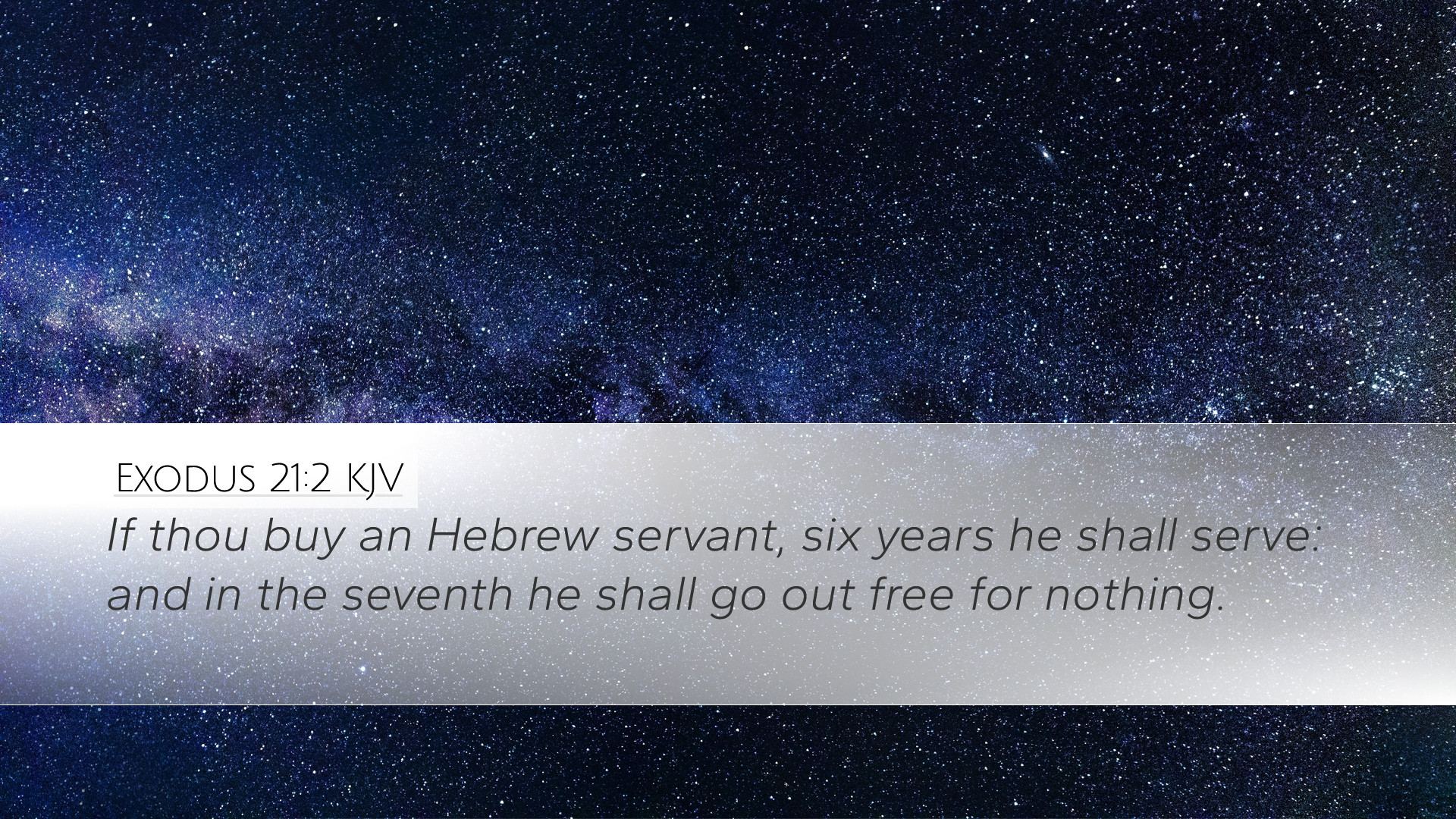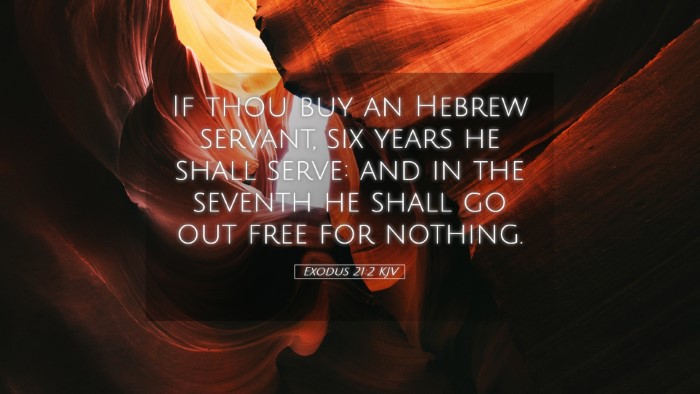Exodus 21:2 - Commentary and Insights
Verse: "If you buy a Hebrew servant, he shall serve six years; and in the seventh he shall go out free, for nothing."
Introduction
This verse is instrumental to understanding the nature of servitude and the legal framework surrounding it in ancient Israel. It unveils God's perspective on justice, economy, and mercy. Here we enlist the insights of several esteemed commentators to unravel this text's depth and significance.
Contextual Background
The Mosaic Law contained in Exodus presents a divinely ordained judicial system intended to govern the people of Israel. Rules about servitude establish a humane treatment of servants, differentiating it from the harsh enslaving practices seen in other ancient cultures.
Commentary Insights
Matthew Henry's Commentary
Matthew Henry highlights the humane treatment embedded within the laws regarding servitude. He notes that the Israelites were to treat their Hebrew servants with dignity, reflecting God's regard for every individual. Servitude is presented not as a lifelong bondage but as a structured relationship with specific guidelines.
- Six-Year Term: Henry points out that the six-year service reflects a balanced economy where even the servant has the prospect of freedom.
- Year of Jubilee: His notes connect this verse with the concept of the Year of Jubilee (Leviticus 25), emphasizing God’s restoration for individuals and His call for justice.
- Development of Character: Servants were to learn responsibility and work ethic, contributing positively to their development, as sanctioned by divine law.
Albert Barnes' Notes
Albert Barnes expounds on the significance of the term "buy," suggesting there’s a contractual relationship implied. He suggests that this implies the servanthood was voluntary, motivated by duties of family or financial distress, marking a distinction between Hebrew servitude and cruel slavery.
- Freedom in the Seventh Year: Barnes expounds on the stipulation of the seventh year, which is mirrored in other practices (e.g., the Sabbath) emphasizing God’s ordained cycles of rest and restoration.
- Possibility of Permanent Service: While the typical period was six years, it also opened dialogue about situations where a servant might choose permanent servitude, highlighting the importance of motivation and choice within bondage.
Adam Clarke's Commentary
Adam Clarke digs into the linguistic aspects of “Hebrew servant,” clarifying that it implies a fellow Israelite, who is bound more by circumstances than by compulsion. This shows a profound respect for one's kin and the communal bonds within Israelite society.
- Duties of the Master: Clarke emphasizes the master’s responsibilities, which included fair treatment and eventual freedom, aligning with God’s character as just and compassionate.
- Obligation to Serve: He notes that servitude also served a purpose in maintaining societal order during economic hardship, thus highlighting the compassion and provision inherent in these laws.
- Spiritual Implications: Clarke relates this physical servitude to spiritual principles, portraying freedom as a core theme in biblical theology, linked to redemption and grace.
Theological Implications
The story of Hebrew servitude in Exodus 21:2 presents essential theological principles relevant to modern church contexts. It argues against the harshness of exploitation, calling instead for a system rooted in love, mercy, justice, and sacred community ethics.
- Justice and Mercy: The systematic release of a servant underscores God’s continual pattern of releasing individuals from bondage, a theme mirrored in New Testament theology concerning sin and redemption.
- Community Responsibility: The Hebrew system reflects a holistic perspective on community, reinforcing that care for one another is vital in exhibiting God’s kingdom on earth, serving as a model for contemporary relationships.
- Hope for Restoration: This law signifies God's overarching narrative of hope, underscoring His aim for humanity’s restoration, revealing an ever-present chance for new beginnings, relevant for believers today.
Practical Applications
For pastors, students, and theologians, the implications of Exodus 21:2 as illuminated by these commentaries can lead to various practical applications:
- Treatment of Others: Advocating for the humane treatment of all, especially those in positions of servitude or dependency, must be prioritized in all ministries.
- Restoration Ministries: Churches and organizations may find motivation in these texts to develop programs aimed at rehabilitating those in bondage, reflecting God's justice and mercy.
- Educational Context: Institutions can develop curricula surrounding biblical justice, integrating these insights to teach students about God’s character and the essential principles of caring for community and ensuring fairness.
Conclusion
Exodus 21:2 provides profound insights into the nature of servitude under God's law, extolling themes of community, justice, hope, and divine care. By synthesizing contributions from Matthew Henry, Albert Barnes, and Adam Clarke, it is evident that these alliances encapsulate the essence of a loving and just God who desires restoration, dignity, and grace for His people.


